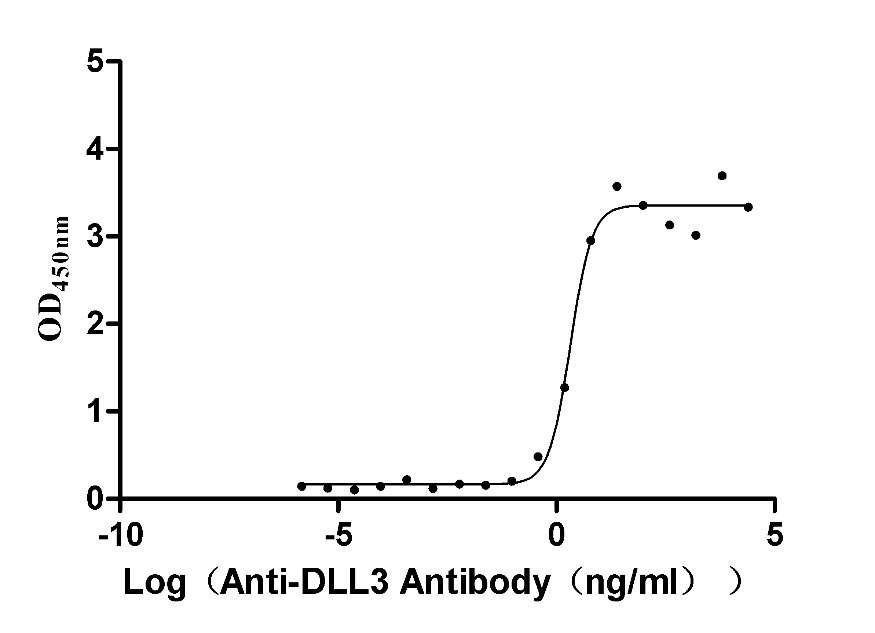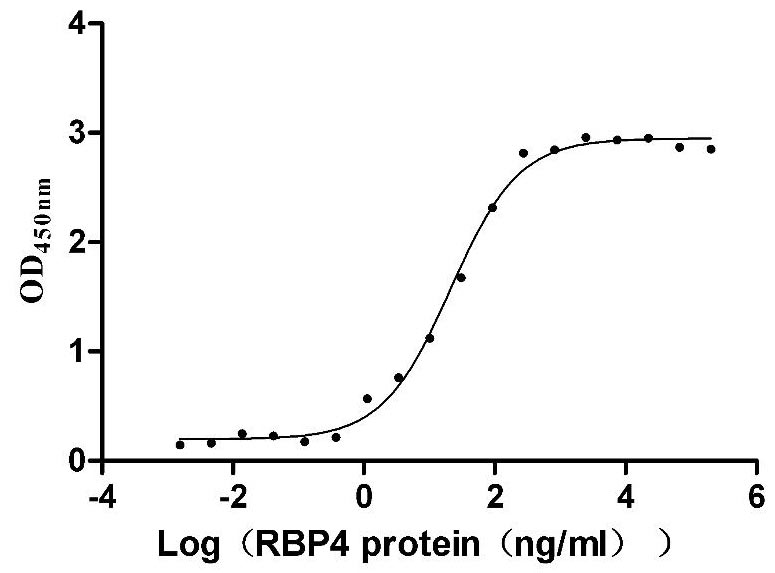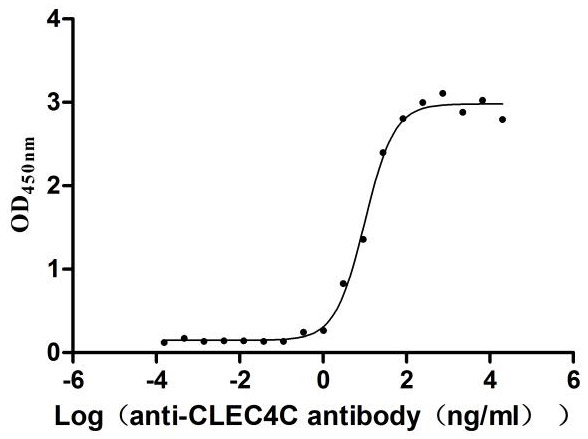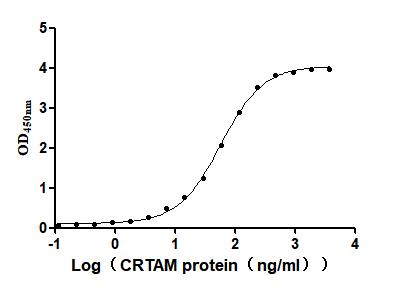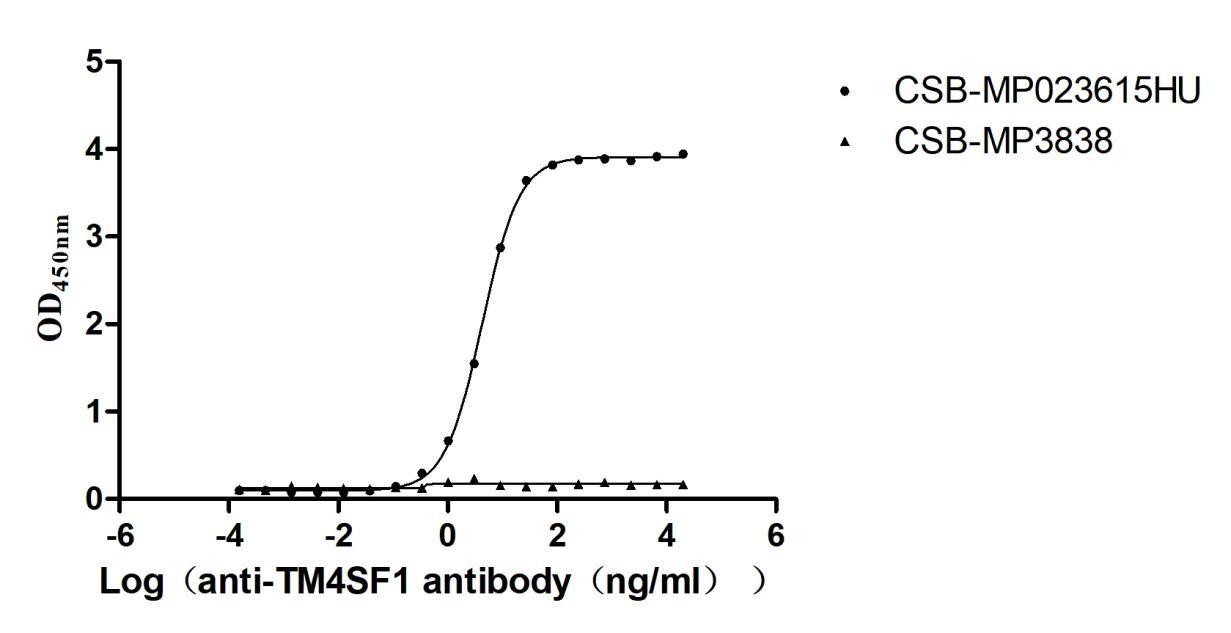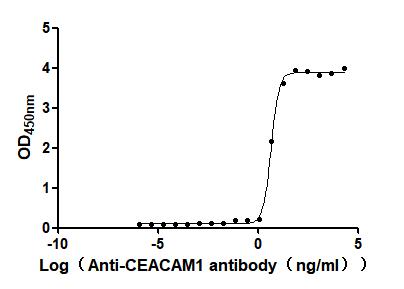Recombinant Human Linker for activation of T-cells family member 1 (LAT), partial
-
货号:CSB-YP012767HU1
-
规格:
-
来源:Yeast
-
其他:
-
货号:CSB-EP012767HU1
-
规格:
-
来源:E.coli
-
其他:
-
货号:CSB-EP012767HU1-B
-
规格:
-
来源:E.coli
-
共轭:Avi-tag Biotinylated
E. coli biotin ligase (BirA) is highly specific in covalently attaching biotin to the 15 amino acid AviTag peptide. This recombinant protein was biotinylated in vivo by AviTag-BirA technology, which method is BriA catalyzes amide linkage between the biotin and the specific lysine of the AviTag.
-
其他:
-
货号:CSB-BP012767HU1
-
规格:
-
来源:Baculovirus
-
其他:
-
货号:CSB-MP012767HU1
-
规格:
-
来源:Mammalian cell
-
其他:
产品详情
-
纯度:>85% (SDS-PAGE)
-
基因名:
-
Uniprot No.:
-
别名:LAT; Linker for activation of T-cells family member 1; 36 kDa phospho-tyrosine adapter protein; pp36; p36-38
-
种属:Homo sapiens (Human)
-
蛋白长度:Partial
-
蛋白标签:Tag type will be determined during the manufacturing process.
The tag type will be determined during production process. If you have specified tag type, please tell us and we will develop the specified tag preferentially. -
产品提供形式:Lyophilized powder
Note: We will preferentially ship the format that we have in stock, however, if you have any special requirement for the format, please remark your requirement when placing the order, we will prepare according to your demand. -
复溶:We recommend that this vial be briefly centrifuged prior to opening to bring the contents to the bottom. Please reconstitute protein in deionized sterile water to a concentration of 0.1-1.0 mg/mL.We recommend to add 5-50% of glycerol (final concentration) and aliquot for long-term storage at -20℃/-80℃. Our default final concentration of glycerol is 50%. Customers could use it as reference.
-
储存条件:Store at -20°C/-80°C upon receipt, aliquoting is necessary for mutiple use. Avoid repeated freeze-thaw cycles.
-
保质期:The shelf life is related to many factors, storage state, buffer ingredients, storage temperature and the stability of the protein itself.
Generally, the shelf life of liquid form is 6 months at -20°C/-80°C. The shelf life of lyophilized form is 12 months at -20°C/-80°C. -
货期:Delivery time may differ from different purchasing way or location, please kindly consult your local distributors for specific delivery time.Note: All of our proteins are default shipped with normal blue ice packs, if you request to ship with dry ice, please communicate with us in advance and extra fees will be charged.
-
注意事项:Repeated freezing and thawing is not recommended. Store working aliquots at 4°C for up to one week.
-
Datasheet :Please contact us to get it.
相关产品
靶点详情
-
功能:Required for TCR (T-cell antigen receptor)- and pre-TCR-mediated signaling, both in mature T-cells and during their development. Involved in FCGR3 (low affinity immunoglobulin gamma Fc region receptor III)-mediated signaling in natural killer cells and FCER1 (high affinity immunoglobulin epsilon receptor)-mediated signaling in mast cells. Couples activation of these receptors and their associated kinases with distal intracellular events such as mobilization of intracellular calcium stores, PKC activation, MAPK activation or cytoskeletal reorganization through the recruitment of PLCG1, GRB2, GRAP2, and other signaling molecules.
-
基因功能参考文献:
- Plasma membrane LAT activation precedes vesicular recruitment defining two phases of early T-cell activation. PMID: 29789604
- LAT1 overexpression represents a negative prognostic marker that has been linked to tumor grade, proliferating potential and angiogenesis and mediates intracellular transport of anticancer agents. PMID: 28815339
- The dimerization-dependent, cooperative binding of the growth factor receptor-bound protein 2 family to LAT may increase antigen receptor sensitivity by reducing signalosome formation at incompletely phosphorylated linker of activated T cells LAT molecules, thereby prioritizing the formation of complete signalosomes. PMID: 28951535
- Nur77 suppresses CD4(+) T cell proliferation and uncover a suppressive role for Irf4 in TH2 polarization; halving Irf4 gene-dosage leads to increases in GATA3(+) and IL-4(+) cells. PMID: 28538176
- LAT and phospholipase C-gamma dephosphorylation by SHP-1 inhibits natural killer cell cytototoxicity PMID: 27221712
- Study examined molecular mobility within LAT:Grb2:SOS assemblies on supported membranes by single-molecule tracking. Trajectory analysis reveals a discrete temporal transition to subdiffusive motion below a characteristic timescale, indicating that the LAT:Grb2:SOS assembly has the dynamical structure of a loosely entangled polymer. PMID: 29045874
- Here we report that phosphotyrosine-mediated assembly of adaptor protein LAT networks yields two distinct kinetic species of the Ras activator SOS PMID: 27370798
- Overexpression of LAT is associated with microcephaly. PMID: 28965845
- LAT and SLP-76 are randomly dispersed throughout the clusters that form upon T cell receptor engagement. PMID: 27875277
- this study shows that inherited LAT deficiency should be considered in patients with combined immunodeficiency with T-cell abnormalities PMID: 27522155
- This is the first report of a LAT-related disease in humans, manifesting by a progressive combined immune deficiency with severe autoimmune disease. PMID: 27242165
- Data show that LAT1 plays an important role in regulating the uptake of essential amino acids such as leucine into endometrial cancer cells. Increased ability of BCH compared to LAT1 shRNA at inhibiting Ishikawa spheroid area suggests that other LAT family members may also contribute to cell growth. PMID: 27486861
- Data indicate that the T cell-specific adaptor protein (TSAd) SH2 domain interacts with CD6 antigen and linker for activation of T cells protein (LAT) phosphotyrosine (pTyr) peptides. PMID: 27896837
- High expression of LAT1 and ASCT2 correlates with metastasis and invasion in esophageal squamous cell carcinoma. PMID: 26936531
- IFT20 is required for the delivery of the intracellular pool of LAT to the immune synapse in naive primary T lymphocytes. PMID: 26715756
- Data show that the palmitoylation mutation of linker for activation of T cells (LAT)attenuated the signal transduction induced by glycosylphosphatidylinositol-anchored CD59 antigen in T cells. PMID: 26271970
- HSV-1-encoded Us3 protein interrupted TCR signaling and interleukin-2 production by inactivation of the linker for activation of T cells. PMID: 25907557
- Patients with severe aplastic anemia had increased levels of LAT and disturbed Th1-Th2 balance. PMID: 24673455
- LAT is a modulator of CD3zeta and ZAP-70 tyrosine phosphorylation. PMID: 24204825
- mutation of palmitoylation site of LAT-EGFP attenuated the signal transduction of CD59 in T cells PMID: 24200054
- findings show that L-type amino acid transporter 1 is a major transporter for essential amino acids into activated human T cells PMID: 24038088
- Histone hypoacetylation on LAT promoter could inhibit LAT expression and enhanced Th2 differentiation, while trichostatin A, a histone deacetylase inhibitor, promoted LAT expression and inhibited Th2 cytokine production PMID: 23360572
- LAT is required to maintain calcium homeostasis in T cells. PMID: 22998346
- A novel function and mechanism of TRAF6 action in the T cell receptor(TCR)-LAT signaling pathway indicates that LAT also plays an adapter role in TCR/CD28-induced activation of TRAF6. PMID: 23514740
- LAT located at the cell surface can be recruited efficiently to activation-induced microclusters within seconds of T cell receptor (TCR) engagement. PMID: 23487428
- LAT cleavage may act as a regulator of TCR-mediated activation of T-cells and not only as a transducer of cell death promoting stimuli. PMID: 23240581
- Expression of constitutively active Raf transgene enhances lymphoproliferation, indicating a role for the Ras-MAPK pathway in LAT-mediated autoimmune hyperproliferation. PMID: 22984075
- Nef employs a dual mechanism to disturb early TCR signaling by limiting the communication between LAT and SLP-76 PMID: 22802418
- Modeling and simulation of aggregation of membrane protein LAT with molecular variability in the number of binding sites for cytosolic Grb2-SOS1-Grb2 PMID: 22396725
- the segment comprising residues 112-126 of human LAT is required for its interaction with Lck. PMID: 22034845
- Activation of T cell antigen receptors resulted in the recruitment and phosphorylation of linker for activation of T cells (Lat) from subsynaptic vesicles. Studies of Lat mutants confirmed that recruitment preceded Lat phosphorylation. PMID: 21642986
- Data show that MAL regulates membrane order and the distribution of microtubule and transport vesicle docking machinery at the IS and, by doing so, ensures correct protein sorting of Lck and LAT to the cSMAC. PMID: 21508261
- PECAM-1-mediated inhibition of GPVI-dependent platelet responses result from recruitment of SHP-2-p85 complexes to tyrosine-phosphorylated PECAM-1, which diminishes the association of PI3K with activatory signaling molecules Gab1 and LAT PMID: 20723025
- LAT recruits Src homology 2 domain-containing leukocyte protein of 76 kDa (SLP-76) following T-cell receptor ligation and Akt kinase phosphorylation in Jurkat cells, activating the phosphoinositide 3-hydroxykinase (PI3K) signaling cascade. PMID: 21282515
- Elevated expression of LAT1 is associated with squamous cell carcinoma of the lung. PMID: 19068093
- Results indicate for the first time that LAT promotes TCR signal initiation and suggest that this adaptor may contribute to maintain active Lck in proximity of their substrates. PMID: 21152094
- LAT ubiquitylation is a molecular checkpoint for attenuation of T-cell signaling. PMID: 21282648
- These results reveal a novel role of HSP90 as a positive regulator for expression of LAT gene in activated T cells. PMID: 21251717
- The adaptor LAT contains several conserved serine-based motifs, which are essential for proper signal transduction through the TCR. PMID: 20940326
- Studies indicate that LAT is present in membrane rafts and involved in signalling through a number of receptors other than the T cell receptor. PMID: 20875087
- A significant decrease of mRNA expression of LAT gene in T cells of asthmatic patients may be due to the up-regulation of its upstream regulatory factors Lck and ZAP-70. PMID: 18683785
- LAT displacement from lipid rafts is a molecular mechanism by which PUFAs inhibit T cell signaling PMID: 12029091
- Phosphorylation of the linker for activation of T-cells by Itk promotes recruitment of Vav. PMID: 12186560
- LAT has a role in signal transduction for T cell activation and is stably associated with plasma membrane rafts PMID: 12515827
- interaction with open-active form of Lck in lipid rafts reveals a new mechanism for the regulation of Lck in T cells PMID: 12570875
- examination of synergistic assembly in T cell plasma membrane domains PMID: 12646565
- The T cell adapter molecule LAT is required for correct orientation of the microtubule-organizing center, as it moves toward the interface of the T cell and antigen-presenting cell. PMID: 12847255
- Results reveal the basis for preferential recognition of specific LAT sites by Gads. PMID: 15029250
- CD3/T cell receptor complex signaling to beta 1 integrins is defective in LAT-deficient Jurkat T cells, and can be restored with expression of wild-type LAT. PMID: 15100278
- LAB resembled a LAT molecule unable to bind phospholipase C-gamma1. PMID: 15153499
显示更多
收起更多
-
相关疾病:Immunodeficiency 52 (IMD52)
-
亚细胞定位:Cell membrane; Single-pass type III membrane protein. Note=Present in lipid rafts.
-
组织特异性:Expressed in thymus, T-cells, NK cells, mast cells and, at lower levels, in spleen. Present in T-cells but not B-cells (at protein level).
-
数据库链接:
HGNC: 18874
OMIM: 602354
KEGG: hsa:27040
UniGene: Hs.632179
Most popular with customers
-
Recombinant Macaca fascicularis Delta-like protein 3 (DLL3), partial (Active)
Express system: Mammalian cell
Species: Macaca fascicularis (Crab-eating macaque) (Cynomolgus monkey)
-
Recombinant Mouse Transthyretin (Ttr) (Active)
Express system: Mammalian cell
Species: Mus musculus (Mouse)
-
Recombinant Human C-type lectin domain family 4 member C (CLEC4C), partial (Active)
Express system: Mammalian cell
Species: Homo sapiens (Human)
-
Recombinant Mouse Cytotoxic and regulatory T-cell molecule (Crtam), partial (Active)
Express system: Mammalian cell
Species: Mus musculus (Mouse)
-
Recombinant Human Carcinoembryonic antigen-related cell adhesion molecule 8(CEACAM8) (Active)
Express system: Mammalian cell
Species: Homo sapiens (Human)
-
Recombinant Human Transmembrane 4 L6 family member 1(TM4SF1)-VLPs (Active)
Express system: Mammalian cell
Species: Homo sapiens (Human)
-
Express system: Mammalian cell
Species: Homo sapiens (Human)


